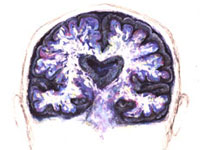Exeter pupils experience the art of the brain
Pupils at schools around Exeter will be exploring science and medicine through art in a project for the BA Festival of Science when it comes to Exeter this September. The project by artist and biochemist Lizzie Burns and funded by the Medical Research Council (MRC) will see Lizzie visiting fourteen local schools from May to June.
In Lizzie’s workshops, students will learn how the brain works and what it is made of, seeing microscopic images of neurones (cells in the brain) and images of the brain responding to emotions.
Students will then make a neurone on a particular theme chosen at random, for example happiness, pain or anger. They will combine their neurones into collages which will be displayed at the University of Exeter during the BA Festival of Science (6-11 September) and then at Exeter Cathedral from 12 September.
“The brain is made up of 100 billion neurones,” says Lizzie. “The idea behind asking students to work together to create a collage is to reflect how the brain works. Just as the students will be working together to create their own neural network, so cells in the brain work together.”
Two years ago, the MRC commissioned Lizzie to produce a series of paintings inspired by the scientific work it funds. In her workshops, she will be working both to explain the science of the brain to the pupils but also encouraging them to explain science through art. Lizzie believes this is important both for encouraging an interest in science at a young age and reaching children who might otherwise turn away from science.
“Children are particularly good at blurring the distinction between science and art,” says Lizzie. “I have spoken to a number of eminent scientists who have all said that they got into science at a very early age, usually before secondary school. Hopefully these workshops will spark the children’s imaginations and inspire them to take up science in the future.”
In Lizzie’s workshops, students will learn how the brain works and what it is made of, seeing microscopic images of neurones (cells in the brain) and images of the brain responding to emotions.
Students will then make a neurone on a particular theme chosen at random, for example happiness, pain or anger. They will combine their neurones into collages which will be displayed at the University of Exeter during the BA Festival of Science (6-11 September) and then at Exeter Cathedral from 12 September.
“The brain is made up of 100 billion neurones,” says Lizzie. “The idea behind asking students to work together to create a collage is to reflect how the brain works. Just as the students will be working together to create their own neural network, so cells in the brain work together.”
Two years ago, the MRC commissioned Lizzie to produce a series of paintings inspired by the scientific work it funds. In her workshops, she will be working both to explain the science of the brain to the pupils but also encouraging them to explain science through art. Lizzie believes this is important both for encouraging an interest in science at a young age and reaching children who might otherwise turn away from science.
“Children are particularly good at blurring the distinction between science and art,” says Lizzie. “I have spoken to a number of eminent scientists who have all said that they got into science at a very early age, usually before secondary school. Hopefully these workshops will spark the children’s imaginations and inspire them to take up science in the future.”


